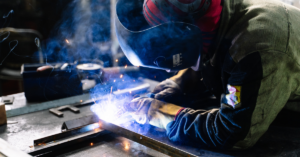
Metal fabrication is an essential process in manufacturing various products, ranging from automobiles to household appliances. Understanding the most common materials is crucial for professionals and enthusiasts alike. Each one possesses unique properties that affect its suitability for different applications. In this blog, we will explore common metal fabrication materials, including their advantages, disadvantages, and uses.
Steel
Steel is a widely used metal manufacturing material due to its exceptional strength and durability. It’s primarily composed of iron and carbon but may also contain other elements to enhance specific properties. The most common types of steel used in fabrication are carbon steel, stainless steel, and alloy steel. Carbon steel is known for its affordability and high tensile strength, making it suitable for structural components and machinery. Stainless steel, on the other hand, offers excellent corrosion resistance, making it ideal for applications where hygiene and aesthetic appeal are important, such as kitchen appliances and medical equipment. Alloy steel combines the strength of carbon steel with various alloying elements to improve specific properties like hardness or heat resistance.
Aluminum
Aluminum is popular due to its lightweight nature, corrosion resistance, and excellent conductivity. It’s approximately one-third the weight of steel while still maintaining considerable strength. This makes it suitable for applications that require weight reduction, such as aircraft components and automotive parts. However, it has a lower melting point compared to steel, which can limit its use in high-temperature applications. Additionally, while aluminum is corrosion-resistant, it may require additional protective coatings in certain environments.
Copper
Copper is valued for its excellent electrical conductivity and thermal properties. It’s commonly used in electrical wiring, heat exchangers, and plumbing components. Highly malleable and ductile, it’s easily formed into intricate shapes. However, it’s relatively expensive, and its susceptibility to corrosion may require protective coatings or alloys to enhance durability in certain applications.
Other Materials
In addition to the aforementioned materials, metal fabrication also utilizes brass, bronze, titanium, and nickel alloys. Brass, an alloy of copper and zinc, exhibits excellent workability and is commonly used in decorative applications, musical instruments, and plumbing fittings. Bronze, an alloy of copper and tin, is valued for its superior strength and resistance to corrosion, making it suitable for bearings, gears, and sculptures. Titanium, known for its exceptional strength-to-weight ratio and corrosion resistance, finds applications in aerospace, medical implants, and chemical processing. Nickel alloys are used in environments with high temperatures, extreme pressures, and corrosive conditions, such as gas turbines, chemical plants, and marine equipment.
There are several types of fabrication materials. Choosing the right one is paramount, as it directly influences the performance, durability, and cost-effectiveness of the end product. Steel, aluminum, copper, stainless steel, and other materials all offer distinct advantages and disadvantages, making them suitable for specific applications. By understanding the properties and common uses of these materials, manufacturers, and fabricators can make informed decisions and achieve optimal results in their commercial metal fabrication endeavors.
This is just an introduction to the wide world of metal fabrication materials. If you want a partner who’s equipped with the skills and know-how for your project, get in touch with EDCO Fabrication!
